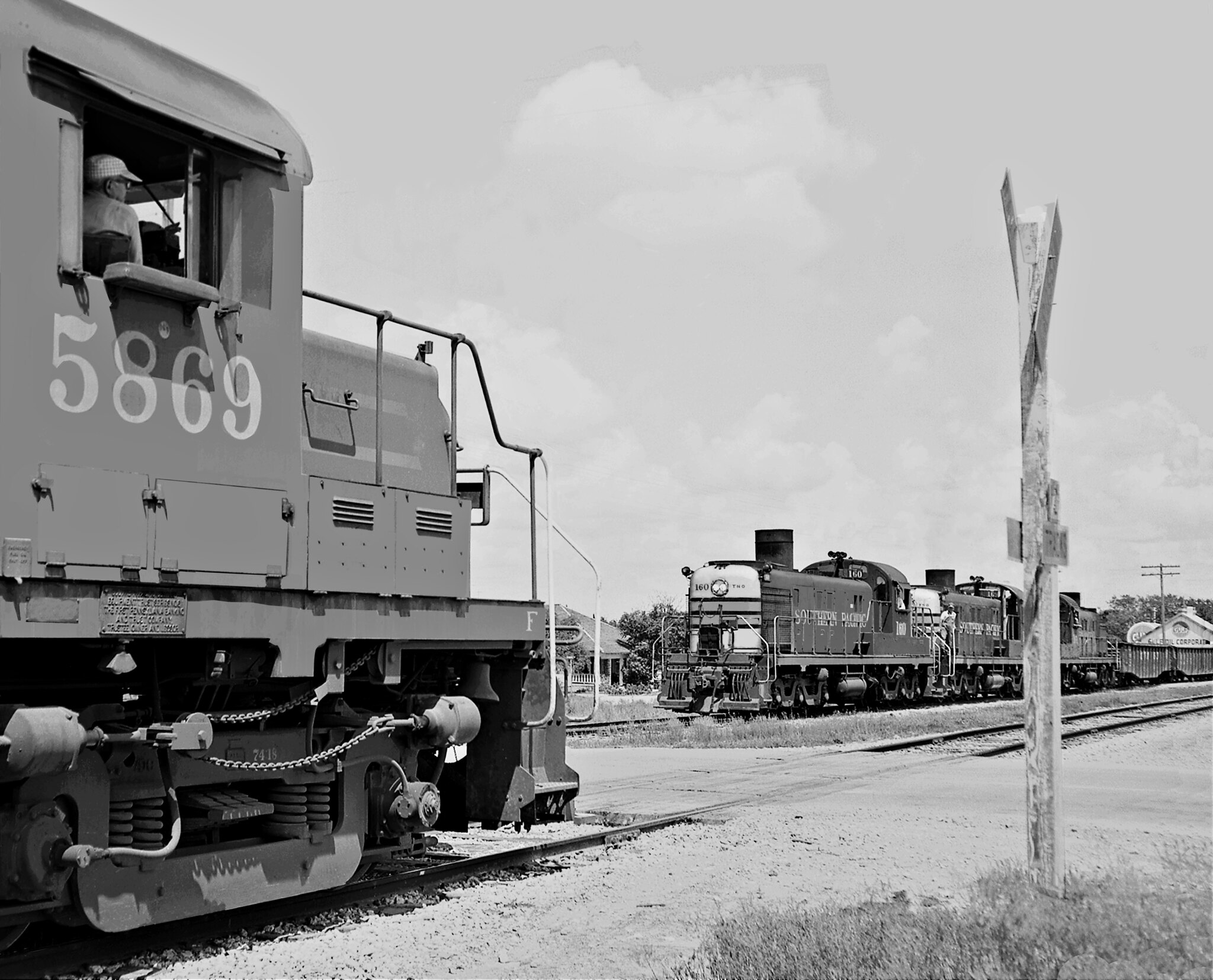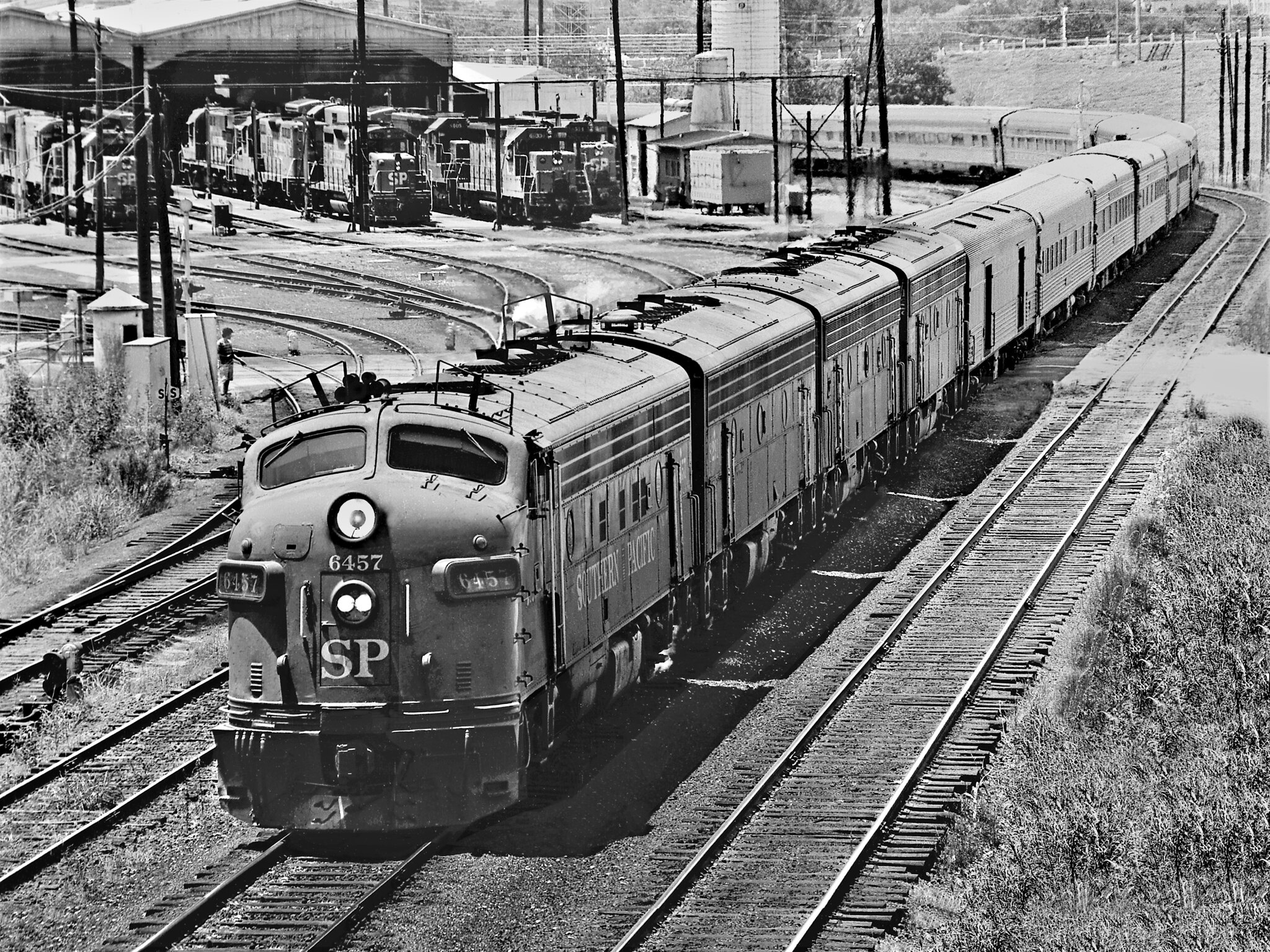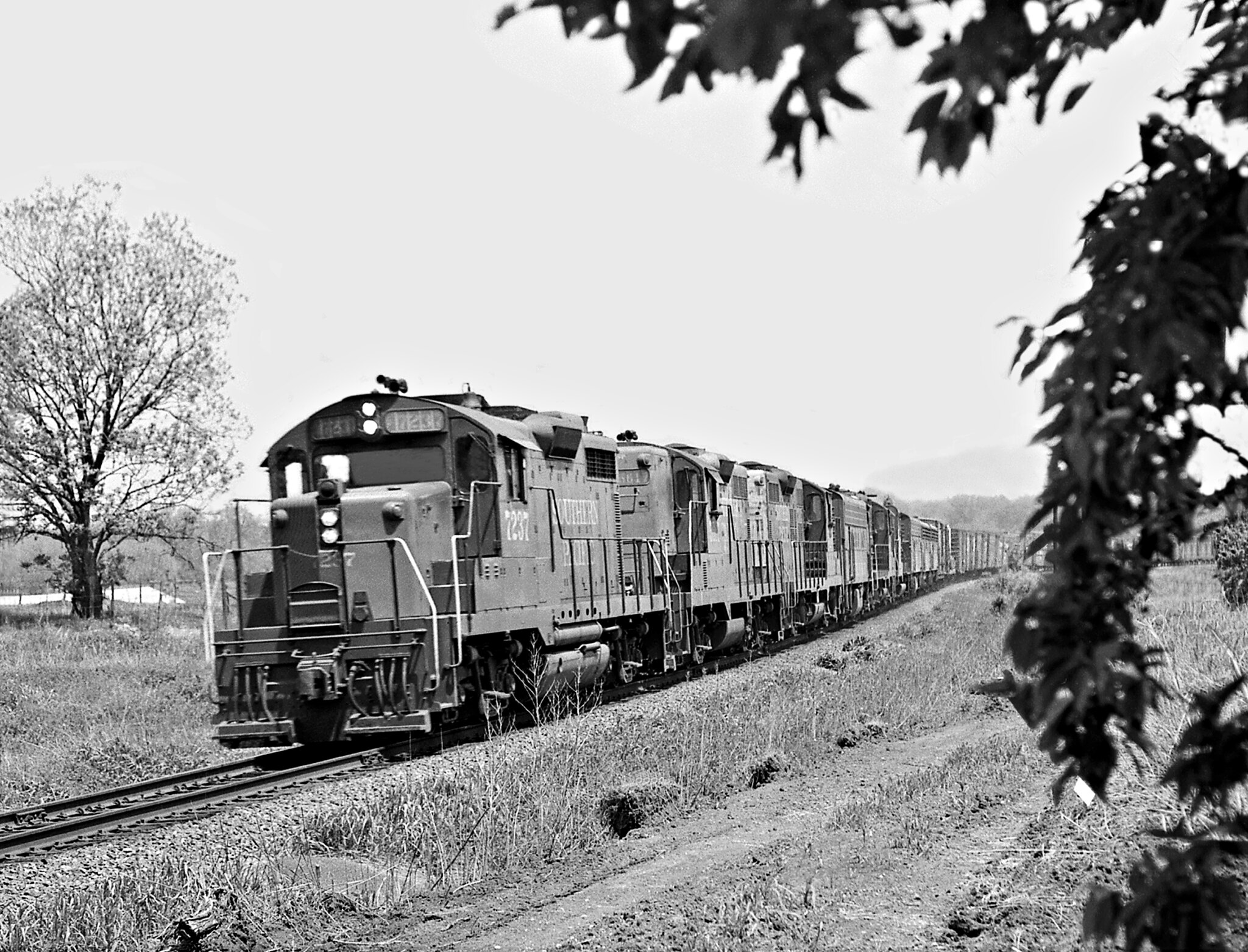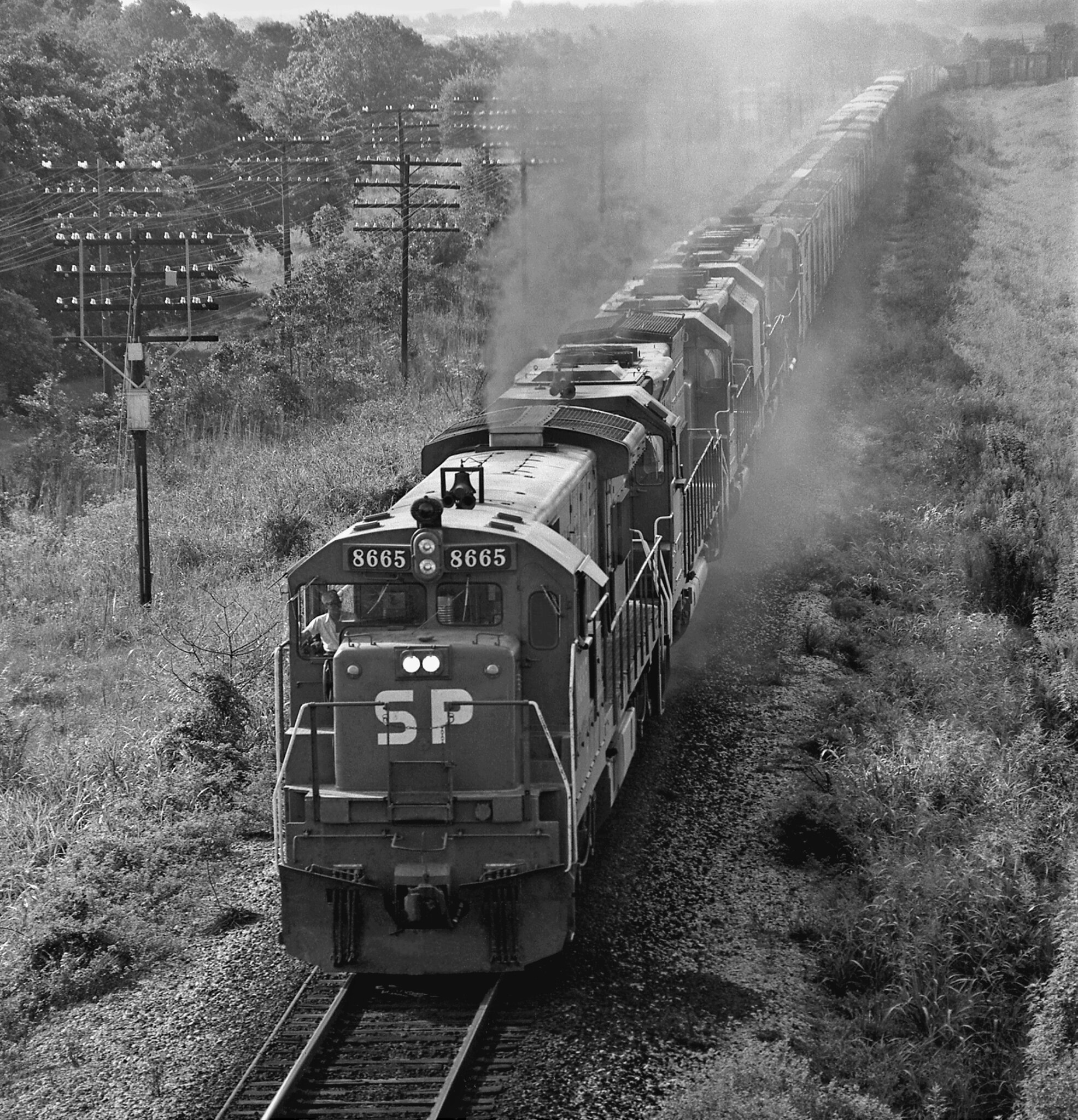An SP/T&NO local freight is holding up the Missouri Pacific Texas Eagle at the diamond at Mcneil Station, and a spirited conversation between the crews from both trains is underway.

An SP/T&NO local freight is holding up the Missouri Pacific Texas Eagle at the diamond at Mcneil Station, and a spirited conversation between the crews from both trains is underway.

With the argument settled, the freight train, hauled by a Southern Pacific Alco RSD-5 in Black Widow livery, gets out of the way.

A meet between two generations of Alco road switchers at Bertram, TX. The trio of RSD-5s are assigned to the Texas & New Orleans (note the smaller 3-digit number series) are headed to Burnet with a local freight, while the #5869 in the foreground is an RS-11 that was part of a 5-unit order in 1959 that were delivered in "Bloody Nose" livery and were set up to run short hood forward. Also, of SP's 37 RS-11s, those last 5 were the only ones that were delivered with low noses.

SP RS-11 #5869 in charge of a crushed rock train entering Cedar Park, TX. The unit behind it is a really interesting one. It has the angled hood of a GP18, but it's actually a GP9. SP's last order of GP9s, #5872-5891, were delivered in August and September of 1959 and these Phase III units came with GP18-style low noses, 48" fans, and were painted in "Bloody Nose". These were among the last GP9s built by EMD for a US customer, and (despite persistent rumors to the contrary), were the only order of low-nose GP9's built for a major railroad.

In reply to NickD :
In this part of the country if you are liked you get a nickname. If someone uses your full name, you are in trouble.
A Cotton Belt (St. Louis Southwestern) Alco RSD-15 "Alligator" leads a jumbled mix of motive power that appears to include an F-unit, an early Alco RS, and two EMD road switchers as they pass the locomotive shops at SP's East Yard in San Antonio, Texas. SP kept buying Alco products in small orders here and there to "keep EMD honest" and tended to have pretty decent luck with their stuff, but the C630s and C415s really soured their relations with Alco, and with GE entering the market, they instead jumped over to GE products. The RSD-15 was a big six-axle, 2400hp bruiser of a machine, picking up where the RSD-7 (which came in an early 2250hp 244 version and then a later 2400hp 244 version) left off. It wasn't a huge sales success, then again neither were it's SD24 and H-24-66 competitors, but they were noted to be great at lugging tonnage around.

SP GP35 #7740 gets under way with a train, while an RSD-15 pair, demoted to yard service by SP, shove cars back into East Yard in San Antonio.

Southern Pacific's Sunset Limited passing the San Antonio engine facilities behind one of SP's faithful F7s. SP tended to just go down the option checklist and select every option when ordering locomotives: dynamic brakes, extra lights, pilot plows, icicle breakers, modified cooling systems.

SP GP20 #7237 with eight other locomotives, all first-generation EMD power, on the famed Blue Streak Merchandise near Corsicana, TX.

An SP U33C is in charge of general manifest out of Hearne, Texas. You can see that the front window on the engineer's side is the one-piece, L-shaped windshield that GE and EMD offered as an option. Not many opted for it, but SP bought quite a few. Manufacturers and railroads both veered away from it later on because of the expense of stocking one unique window, and some units were even converted to standard windows.

An SD40T-2 "Tunnel Motor", also leaving Hearne, and also optioned with the one-piece engineer's side windshield. SP and D&RGW approached EMD about designing a cooling system that wouldn't overheat while going through all the tunnels and snow sheds that they had on their mountain passes, and EMD's solution was to move the radiators low on the body where they would draw in cooler air. Weirdly, SP assigned the later SD45T-2s to the Cotton Belt, which was flat running and had zero tunnels.

A single Cotton Belt GP40 with one of SP's weird little Sprints. The idea behind short-haul, daily freight actually dated back to 1935, when SP began running overnight, less-than-carload daily freight trains with 30-40 express cars behind an MT-1 Mountain or a GS-series 4-8-4. It was revived later with a bunch of different runs, Houston-Dallas being a big one, as was LA-Phoenix.

SP/T&NO Geeps with the big trashcan Gyralites cross the diamond near Avondale Yard on the west bank of the Mississippi River with the westbound Argonaut. The Argonaut was SP's secondary train from LA to New Orleans and had a much slower schedule than the Sunset Limited.

NickD said:Two of the T&NO's Alco PAs cross the Huey P. Long Bridge out of New Orleans with the Argonaut.
Wow, it's crazy seeing how rural that area was.
NickD said:NickD said:NickD said:I saw a flyer on Facebook for this RDC charter trip on the Reading & Northern with rare mileage, photo runbys, and a visit to see CNJ #113. I'm strongly considering purchasing a ticket for this. Originally they were also advertising going to Good Springs but R&N said they didn't feel comfortable enough with the track condition to take passengers there.
Well, I sent my check in the mail for this yesterday. I'll drive down Friday, and my hope is to go to either the Colebrookdale Railroad or the Allentown & Auburn on Friday, ride this excursion Saturday, and then head over to Strasburg and spend the day photographing there before heading home.
Hmmm, well if East Broad Top has gotten the #16 running and if they are operating regular steam-powered excursions by then, maybe instead of heading west to Strasburg on Sunday, I'll head further south to Orbisonia and finally get to see the East Broad Top in action.
I was getting nervous for a bit about this trip, because I mailed the check three weeks ago, and the money hadn't been withdrawn from my account. I was afraid it was going to one of those "Damned if you do, damned if you don't" situations, where if I sent them another check, they'd get the first one and I'd get billed for two tickets, and if I waited to see if they got it, they wouldn't and then the trip would be sold out by then. Oh, and it says you can use the form on the website, but when you go to the page, it has at the top of the page Do Not Use This Page. Huh, that's helpful.
Which brings up a gripe I have: It's the year 2023, stop having mailed checks be the only way to buy tickets/donate money. Arcade & Attica is always asking for donations to restore #18, but the only way to donate is to mail them a check. Well, no wonder it's taking forever to fundraise. It's not that hard to set up a website for donations, and I guarantee it would probably raise money faster.
Almost two weeks after the check was cashed, still no tickets. If they don't show up before the trip, I'm just going down there with my checkbook and my bank account transaction history and going "Look, I sent you this check, somebody cashed it, I never received tickets, let me aboard."
Also, I saw East Broad Top announced that after the Winter Spectacular, all regular excursions will be steam powered. Hurray! Except that regular excursions start until May 5th. Boo!
So now, it's either back to the plan of heading west to Strasburg, or, head east and go ride SMS Rail Services new Woodstown Central, which is their new passenger endeavor. They're running 32 mile trips in a caboose behind a Baldwin diesel switcher. Hmmm.
ATSF F3s lean into the S-curve at Rogers, Texas with the Texas Chief in May of 1967. Service south of Houston had ended the month before and just over a year later, they would end the section to Dallas as well. The Texas Chief would continue on into Amtrak but the Santa Fe would pull the rights to the Texas Chief name due to a perceived decline in service, forcing Amtrak to rename it to the Lone Star.

The fireman aboard ATSF U30CG #403 prepares to grab orders as the Texas Chief bears down on the ATSF/MP diamond at Milano, TX. In 1966 and 1967, ATSF purchased the GE U38CG and U30CGs to displace the aging E- and F-Units off of their passenger trains, trading in their Alco PAs on them. While the U28CG was just a regular U28C road switcher with a steam generator in the back, the U30CG used the GE U30C frame and running gear but had a full-width body that used fluted stainless-steel panels, as well as a cowl nose. Their moment in the lime light was short-lived though. In February of 1969, a U30CG derailed while hauling the Grand Canyon Limited on Edelstein Hill near Chillicothe, Illinois. The U30CG design was suspected, and after a series of tests, both classes of GE passenger locomotives were placed on freight assignments, and never were reinstated to passenger service. The U30CGs were renumbered to #8000–8005 and over time were repainted into blue and yellow (either the old freight scheme or Warbonnet), had their steam generators removed, the openings covered, and the shared fuel/water underbody tanks converted to fuel only for greater range. They were used mainly in Colorado freight service and other secondary assignments until September 22, 1980. Considering this photo is dated May of 1970, this is probably near the very end of U30CGs on passenger service.

ATSF #315 on the left has been repainted into the blue and yellow freight unit, but has been pressed back into passenger service on the Texas Chief after the demotion of the U28CGs and U30CGs. The #340 on the right is still in freight service. Amtrak has actually been in service for 2 months, but the look is still all ATSF.

Framed through a speeder car, a pair of CF7s bracket a pair of F7Bs on a grain train at Rogers, TX. Those CF7s have the curved roof cabs, which was an actual chunk of the F7 carbody roof. The earlier CF7s used this roof, because it was believed to be a cost savings, but it required custom panes of glass that the shops had to stock, which meant they were more expensive to maintain. They then swapped to the angular cabs, which cost more to construct, but were cheaper in the long run because they used the same windshields and windows as every other EMD cab.

A road freight passes around a CF7-pulled local freight at Belton, TX. The road freight has at least two SD24s in the consist, identifiable by the four cylindrical air tanks on the roof. A fairly rare catch in 1977, considering ATSF had started the SD26 rebuild program in 1973 and it finished in 1978. One of the identifiers of an SD24 that had been rebuilt into an SD26, was that rather than the air tanks being four across, it had them mounted all on the outside with two on each side.

You'll need to log in to post.